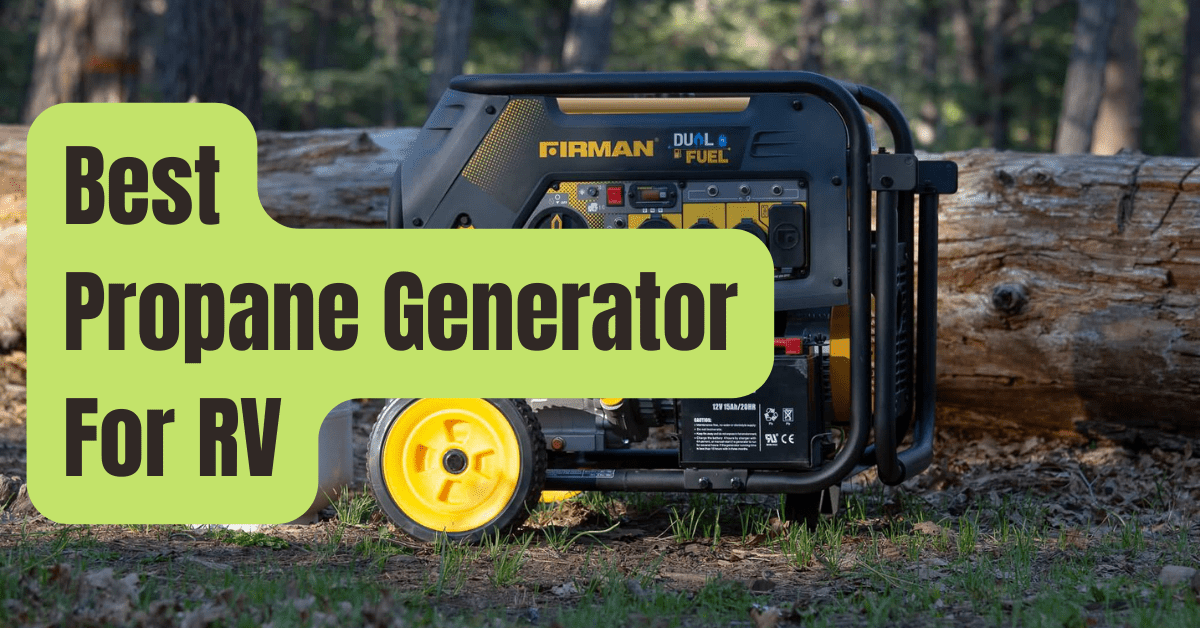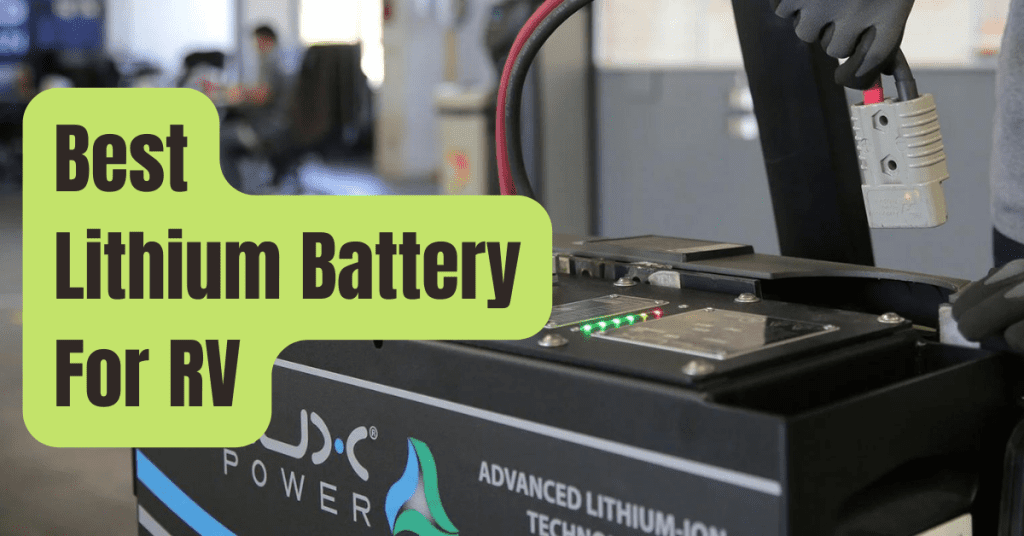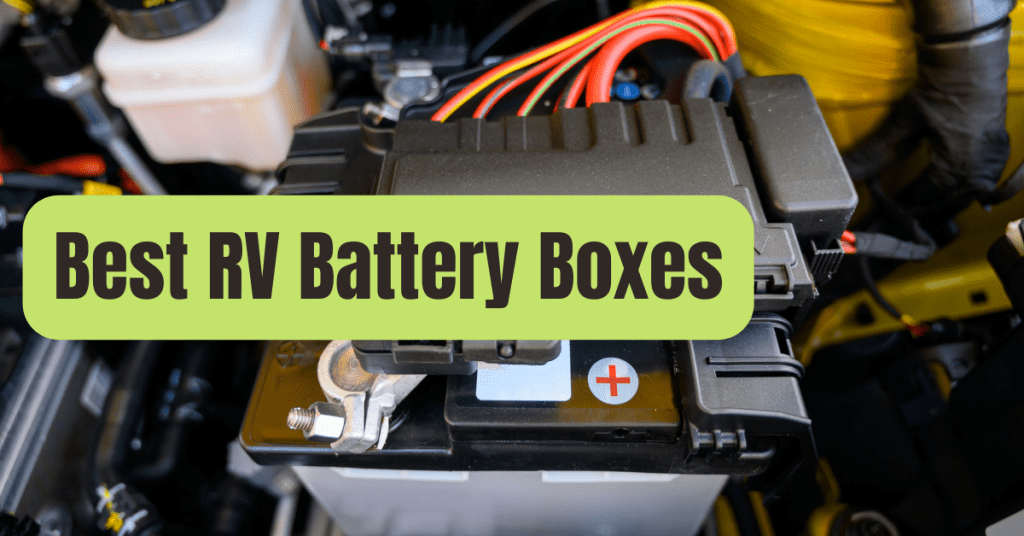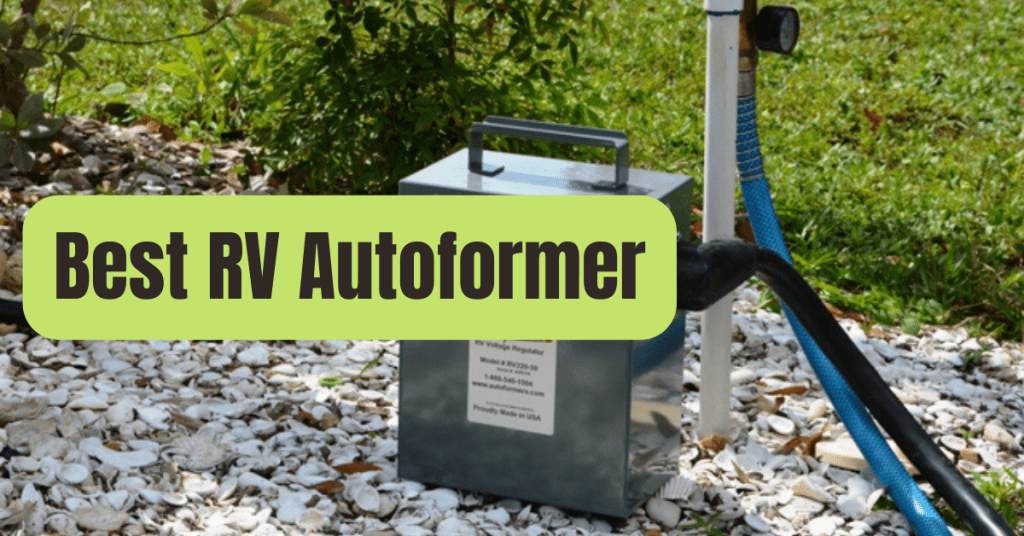When you can’t connect to a source of AC power, you’ll need a good generator.
If you want to use the microwave or turn on your air conditioner, you’ll need to start your generator.
While the majority of generators operate on gasoline, some may run on propane.
The most adaptable generators on the market can really run on either gas or propane.
The most important reason to acquire a propane generator for your RV is to save money on gas.
In most circumstances, propane is less expensive than gasoline, allowing you to save money on long-term fuel bills.
A propane generator, on the other hand, might come in handy if you plan on staying in your RV for a lengthy period of time.
As a more stable fuel supply, some RV owners (like me) may connect their generator to an external propane tank.
You may ensure a steady power source by attaching an external tank to your generator instead of frequently moving your RV to replace the onboard tank.
We’ve produced a selection of the top propane generators on the market today to assist you in your search for a propane generator for RV usage.
Our list provides specifications and characteristics for each generator so you can quickly locate one that meets your needs.
Our in-depth Buying Guide lays out the most critical factors to consider when buying a propane generator.
Finally, the Frequently Asked Issues area is a fantastic place to look for answers to some of the most frequent propane generator questions.
In 2026, The 6 Best RV Propane Generators
Our list includes six different types of the finest propane generators for RVs.
The goal of our investigation was to locate the best propane generator for your RV.
So let’s get right into our propane generator evaluations, beginning with one of the most well-known companies in the industry: Onan.
#1. Best Overall: Cummins Onan 2500 Watt LP Vapor Generator

There’s a reason why Onan Generators are installed in so many RVs and travel trailers.
The Cummins Onan 2500 Watt LP Vapor Generator is a reliable RV propane generator from one of the most reputable manufacturers in the market.
This generator is controlled by a microprocessor, which makes it much simpler for a technician to detect problems fast.
This is a significant benefit that will allow you to spend less time at the mechanic shop if this generator requires servicing.
However, Onan generators have a reputation for lasting a long time.
The Onan generator at the rear of my 1997 RV is still working.
This type has a completely enclosed construction that reduces overall sound output for individuals who don’t want their generator to create a lot of bothersome noise.
It also features a single-side construction that allows it to be maintained without having to remove the complete generator from the underside compartment of your RV.
Things We Enjoy
- Reputation: In the generator sector, Onan is associated with quality.
- Microprocessor Control: If required, this function aids in generator troubleshooting.
- Single Side Service: If the generator is housed in an RV compartment, it is significantly simpler to maintain.
- Completely Enclosed Design: This reduces the amount of noise produced.
Things We Don’t Appreciate
- Price: “You get what you pay for,” says the adage. However, this Onan generator is one of the most expensive types available.
#2. Best Budget: ALP 1,000-Watt Propane-Powered RV Generator
The ALP 1,000-Watt Generator is one of the most cost-effective RV propane generators on the market right now.
While it has a low working power, this generator is a fantastic choice for someone on a tight budget who needs a portable propane generator.
Because this propane generator is just 28 pounds, it will not add a lot of weight to your RV.
You may also use it as a portable generator by connecting it to your RV when necessary.
This implies that, if you so wish, you may use this generator for purposes other than powering your RV.
You may connect this generator to propane tanks of different sizes using an appropriate hose.
While you don’t need a 120-gallon tank as I did in the winter of 2019, this generator can operate for three hours on a one-pound tank and up to 60 hours on a 20-pound tank.
The fact that this generator offers numerous charging choices is another aspect that caught my attention.
It contains a USB connection that may be used to charge cellphones and other electrical devices.
It also features two 120-volt AC outlets, which may be used to charge or power bigger equipment.
If you need more power, you may connect two of these generators side by side to provide enough watts to run an RV air conditioner.
Things We Enjoy
- Lightweight: This generator is just 28 pounds in weight.
- Price: This is one of the most reasonably priced propane generators on the market.
- Extended Run Time: When linked to a 20-pound propane tank, this generator can operate for up to 60 hours.
- Parallel Capability: You may link two of these generators together to provide extra power for all of your bigger RV equipment.
Things We Don’t Appreciate
- Low Running Wattage: This generator should be able to power your refrigerator, but it will most likely not be able to power your air conditioner.
#3. Best with Electric Start: Champion 3,800-Watt Dual Fuel RV Ready Generator

Look no farther than the Champion 3,800-Watt Dual Fuel Generator if you want a generator that can operate on either propane or gasoline.
This variant allows you to move back and forth between two fuel sources, improving your fuel efficiency even more since you may choose the less expensive fuel type at various times.
Depending on the kind of fuel you use, this generator is rated for varied starting and operating watts.
On propane, it’s rated for 3,800 running watts and up to 4,750 beginning watts, and on natural gas, it’s rated for 3,420 running watts and up to 4,270 starting watts.
This generator features a dependable electric start that employs a handy toggle switch to power a 224cc Champion engine, making it ideal for individuals who work in a variety of conditions.
The electric start also comes with a long-lasting battery that won’t need to be replenished often to keep the starter running.
Last but not least, I like the clever control panel that comes with this generator.
This panel’s gauge shows voltage, hertz, and run-time hours to help you better understand the generator’s power production.
It also helps you keep track of maintenance intervals so you can make sure your generator is in good working order.
Things We Enjoy
- Dual Fuel Versatility: Gasoline or propane may be used to power this generator.
- Good Wattage Ratings: The wattage of this generator is sufficient to run most RV air conditioners.
- Electric Start: Provides more consistent beginning in a variety of scenarios.
- Intelligent Control Panel: This panel allows you to keep track of voltage, hertz, and run-time hours in one convenient location.
Things We Don’t Appreciate
- Weight: This generator is little under 120 pounds in weight.
- No Parallel Capability: If you require more power, you won’t be able to link this generator with another unit.
#4. Best For Power and Portability: All Power America 10000 Watt RV Generator

The All Power America APG3590CN propane generator is a great choice for those looking for a great blend of power and mobility.
This beast can provide up to 10,000 peak watts and 7,500 operating watts.
This amount of power is sufficient to operate most RV air conditioners as well as a few smaller appliances.
Despite its greater size (31.69 inches by 21.3 inches by 25.2 inches), it comes with a flat-free wheel kit to let you adjust it if you don’t want to place it right below your RV.
The generator is rated for a run-time of up to 8.5 hours when operating at half-load.
This is due to the unit’s 20-pound fuel capacity, which is roughly equal to five gallons.
It also has a low oil shut-off feature that turns the motor off automatically if the oil level falls below a certain level.
This may save your engine a lot of money in the long run.
I also like the fact that this generator includes a number of add-ons.
A meter to monitor voltages and hours of run-time, a battery, and a propane fuel pipe to connect the generator to an external fuel tank are among the optional extras.
This third feature is especially useful if you reside in a colder climate and can’t move your RV every week or so to replace the internal propane tank.
Things We Enjoy
- High Running Wattage: This generator has a max power rating of 10,000 watts.
- Portability: It comes with a flat-free wheel kit that makes moving around considerably simpler.
- Reasonable Run Time: When operated at half load, it may last up to 8.5 hours.
- Add-Ons: A propane fuel pipe, battery, and volt and hour meter are included with the generator.
Things We Don’t Appreciate
- Weight: This generator is above 200 pounds in weight.
- Operating Noise: The noise output of this generator is rated at 75 decibels.
#5. Best For Extended Run Time: Firman H08051 Dual Fuel Portable Generator CARB Certified

Look no farther than the Firman H08051 propane generator if you’re seeking for a propane generator with a long operating duration while using just its internal fuel tank.
In fact, this device can operate on either propane or gasoline, giving you additional options in an emergency or when one fuel type is much less expensive than the other.
It also has an eight-gallon gasoline tank built in, which allowing it to operate for up to 12 hours on a single tank.
It also comes with a 5.5-foot propane fuel pipe, allowing you to connect it to an external fuel tank as necessary.
Unlike other generators, which are designed to produce either 30 amp or 50 amp electricity, this generator can provide both.
When operating on gasoline, it produces 8,000 running watts and 10,000 peak watts.
It’s rated to provide 7,250 and 9,050 running watts when using propane.
I particularly like the fact that this generator has an electric start.
This feature makes generators simpler to start in cold weather and eliminates the need for additional effort with a crank start.
Things We Enjoy
- Extended Run Time: On its built-in 8-gallon tank, this generator can operate for up to 12 hours.
- For RVs of All Sizes: This generator can provide real 30 amp or 50 watts of electricity.
- Included Propane Hose: You may connect to an external propane tank with a 5.5-foot propane fuel pipe.
- Dual Fuel Capability: Propane or gasoline may be used to power this generator.
Things We Don’t Appreciate
- Price: If you purchase this generator, you may be hoping that it is the only one you will ever need.
- Noise Output: This generator has a noise output of 74 dba, which is louder than an average conversation.
#6. Best Peak Wattage: DuroMax XP12000EH Electric Start Portable RV Generator

Look no farther than the Firman H08051 propane generator if you’re seeking for a propane generator with a long operating duration while using just its internal fuel tank.
In fact, this device can operate on either propane or gasoline, giving you additional options in an emergency or when one fuel type is much less expensive than the other.
It also has an eight-gallon gasoline tank built in, which allowing it to operate for up to 12 hours on a single tank.
It also comes with a 5.5-foot propane fuel pipe, allowing you to connect it to an external fuel tank as necessary.
Unlike other generators, which are designed to produce either 30 amp or 50 amp electricity, this generator can provide both.
When operating on gasoline, it produces 8,000 running watts and 10,000 peak watts.
It’s rated to provide 7,250 and 9,050 running watts when using propane.
I particularly like the fact that this generator has an electric start.
This feature makes generators simpler to start in cold weather and eliminates the need for additional effort with a crank start.
Things We Enjoy
- High Wattage Rating: This generator has an operating wattage of 9,500 and a peak wattage of 12,000 watts.
- Dual Fuel Capability: This generator can run on either propane or gasoline as a fuel source.
- Low Oil Shutdown Feature: This function serves to safeguard the engine from harm that may occur if it was left running without enough oil.
- Idle Control: When the engine is not in use, the RPMs are reduced to conserve fuel and energy.
Things We Don’t Appreciate
- Price: This generator is one of the more expensive alternatives, but it is still affordable considering the amount of electricity it can produce.
- Size: It is 30 inches long, 29 inches wide, and 26 inches tall, and weighs 224 pounds.
How Do You Pick The Right Propane Generator For Your RV?
So there are six excellent propane generator alternatives for RV usage.
But first, let’s look at the most significant characteristics that will help you distinguish between various models and, finally, choose the generator that’s most suited to your requirements.
#1. Wattage Ratings
The first step in selecting the correct generator is determining how much electricity you’ll need to operate your RV’s main systems.
Consider the devices and appliances you’d most want to be able to use if you were to depend only on generator power.
Refrigerators, water pumps, central heating systems, water heaters, air conditioning units, fans, and anything else you think necessary for living comfortably in your RV are examples of these items.
The wattage ratings for all of your RV’s appliances should be listed somewhere in the owner’s handbook.
Once you’ve found these ratings, examine the highest beginning or peak wattages of the appliances that use the most electricity.
You may get a good idea of how much watts you’ll need from a generator by adding the beginning wattages of your two or three biggest appliances.
Even if you choose a generator that can handle it, keep in mind that you shouldn’t run all of your appliances at the same time.
#2. Convenience
You won’t have to worry about mobility if you want to put a new propane generator in an underbelly compartment of your RV.
In this scenario, all you have to do is double-check that the generator you chose will fit inside the compartment.
You must also ensure that the compartment can withstand the weight of the generator.
However, if you want to utilize a generator for a fixed RV while still being able to move it about for other uses, you’ll need to be okay with the weight and proportions of the generator.
A wheel kit, which enables you to roll rather than lift a bigger generator, is a nice feature to check for.
Smaller units should always come with handles, but if they don’t, this is an early red signal that moving it around will be more difficult than required.
Consider how far and how frequently you’ll need to transport the generator when determining its weight and size.
#3. Flexibility
It’s usually a good idea to see whether a generator may be used for several purposes.
Features like as dual-fuel capability, mobility, and the capacity to deliver numerous alternative power connections are examples of this.
Some generators, for example, may provide both 30 amp and 50 amp power connections.
If you now have a 30 amp RV but want to convert to a bigger RV with a 50 amp hookup in the future, this may be handy.
Of course, the converse is true for anybody who plans to downsize their RV in the future.
A smaller propane generator is also more adaptable since it may be used for purposes other than generating electricity to your RV.
It may come in handy for tailgating, hunting, or providing additional electricity during a backyard party.
Make sure the generator you choose is adaptable enough to satisfy all of your demands before you buy it.
Only you know your specific demands (and they’re sure to vary! ), but it’s still worth thinking about how your generator can and will adapt to your lifestyle.
#4. Maintenance
A generator’s simplicity of maintenance is another factor to consider before purchasing.
While the expectation is that you would handle your generator with such care that major maintenance difficulties will be rare, regular maintenance will always be required to assist prolong the life of your generator.
Portable generators are usually the most convenient to maintain since they’re easy to transport and have access from all sides.
This enables you to quickly identify and fix any maintenance problems that arise.
However, installing a generator in your RV’s bottom compartment might make maintenance more challenging.
That is why generators designed expressly for this sort of installation exist.
All of the key areas for maintenance may be accessed from a single panel on these generators.
So, Which Is The Most Appropriate For You?
The wonderful thing about RV living (and, indeed, life in general) is that there is no one-size-fits-all approach.
So I’ve taken the effort to recommend some scenarios that each of the six propane generators I discussed above might be most suited for.
Look into the Cummins Onan 2500 Watt LP Vapor Generator if you want to put your faith in a generator brand that is recognized for its quality and dependability.
The Onan brand is well-known in the generator sector, and this model is also one of the quietest models on our list.
Don’t underestimate the benefits of the ALP 1,000-Watt Generator when buying for a generator on a budget.
While it has a lesser total wattage, this generator has a parallel capability, which allows it to provide more power to your RV.
The Champion 3800-Watt Dual Fuel Generator is ideal for those who just want a generator that is simple to start when they need it most.
It features an electronic start, which eliminates the need for a crank start, and it can operate on either propane or gasoline, depending on which is most cost-effective.
The All Power America APG3590CN propane generator is an excellent alternative for RV owners looking for a powerful but portable generator.
It provides enough of running and starting wattage while also being able to be moved into a new position if you need to reposition it.
The Firman H08051 propane generator is a good option if you want a generator with a lengthy run duration on its own built-in fuel tank.
It includes an eight-gallon built-in tank with a 12-hour run duration and can be connected to an external propane tank for additional run time.
The DuroMax XP12000EH model is ideal for those who simply want to get the most power out of their propane generator.
This generator is also ideal for RVs that need a 50 amp electrical hookup.
FAQs
Generators aren’t the most difficult pieces of machinery to operate.
They do, however, require some getting used to.
In this part, I’ll address a few typical questions to assist you in selecting and maintaining the generator of your choice.
How can I figure out how much electricity I’ll need?
Adding up the operating and starting wattages of all the appliances in your RV is the simplest approach to establish your RV’s wattage requirements.
To make things simpler, concentrate just on the beginning wattage, which will be greater than the running wattage.
However, it’s unlikely that you’ll be using all of your appliances at the same time.
So, if you just want to concentrate on one or two appliances, examine the ones that are most important to the running of your RV.
Microwaves, air conditioners, and refrigerators are all examples.
Is it possible to use these generators with an external propane tank?
Yes, to put it simply.
However, not all of these generators have this feature, so be careful to look at each model separately for a more accurate response.
A generator that comes with a length of propane fuel pipe built for that purpose is a good clue that it will function with an external propane tank.
What is the difference between a dual-fuel generator and a single-fuel generator?
It’s exactly what it says on the tin: a dual-fuel generator.
It’s a generator that can operate on two different kinds of
fuel at the same time, but not at the same time.
You’ll have to choose between the two fuels, and some generators may produce less energy while operating on propane than when running on gasoline.
The most frequent fuel types utilized by dual-fuel generators are gasoline and propane, however there are certain versions that may operate on diesel.
What are some ‘best practices’ for generator maintenance?
If you’re staying in your RV for a while, it’s a good idea to use your generator every two weeks or so.
At the absolute least, once a month, activate your generator for a few hours.
Ascertain that the oil reservoir is filled to the proper level.
Check the fuel level and do a visual examination to ensure that all components are clean and nothing seems to be out of place.
Conclusion
As someone who has previously overwintered in an RV, I can tell you from personal experience that heating my RV with propane was much more cheap than utilizing an electrical heating source.
RVers who aren’t on the grid, on the other hand, don’t have the option of utilizing a steady supply of AC power for heat.
For some RVers, using a generator is a must.
It may also be a lifeline for those of us who live full-time in an RV off the grid.
In any case, it’s an important source of RV electricity, and propane generators may be a more fuel-efficient way to get the job done.
I hope you’ve learned something new about purchasing a propane generator for use in an RV, and I wish you nothing but the best on your future RV trips!










